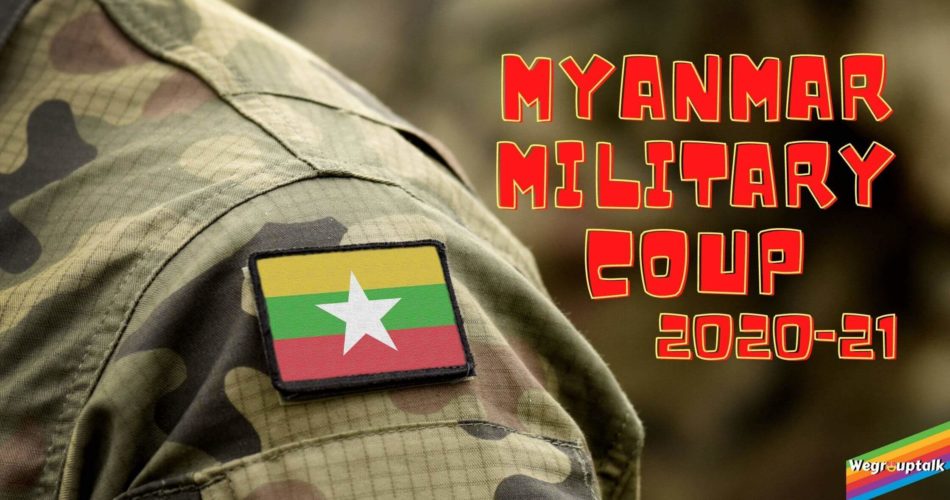On 1 February 2021, the roads were rumbling with military vehicles and heavy patrolling by the troops. People also faced several communication disruptions like battered internet connectivity and halted tv signals. Even the telephone lines were also disrupted. It was not long when the military coup announcement was announced by the state military channel Myawaddy TV.
The military coup comes with one year emergency period in the country and the totalitarian shift of power. It was also announced that Commander-in-Chief Min Aung Hlaing would vest the legislative, administrative, and judicial power. Nobel laureate and the President of the National League for Democracy(NLD) Aung San Suu Kyi have been detained and several prominent leaders of Myanmar.
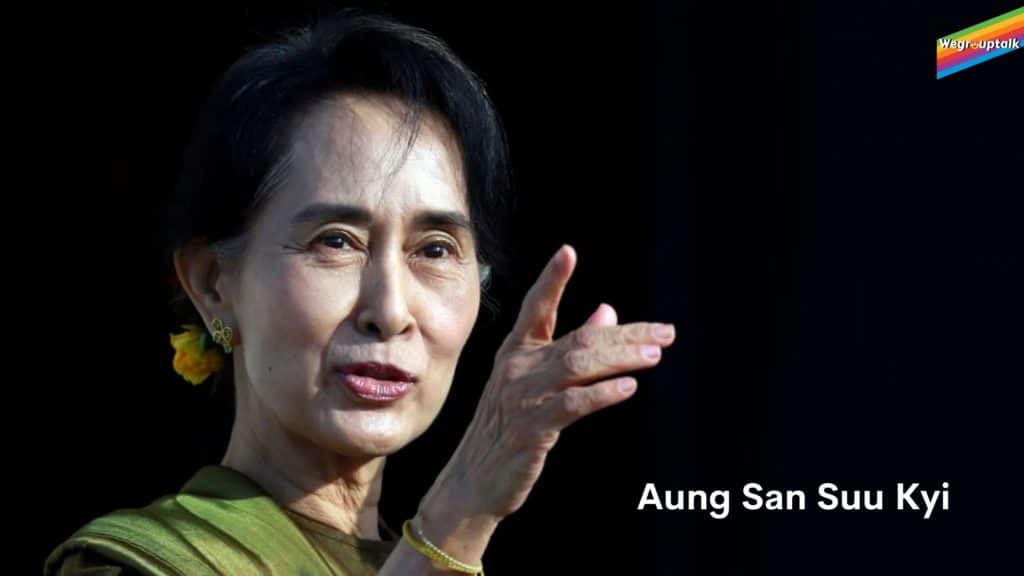
Aung San Suu Kyi battle with Detention and Military Hegemony
Post the victory of NLD in the 2015 general elections, Aung San had been acting as the State Counsellor of Myanmar. This post was exclusively created as the constitution didn’t grant her to be the Prime Minister since her husband and children were foreign citizens. However, many bureaucrats, monks, and parliamentarians have been put under house arrest.
These also include activists who were a part of the Saffron Revolution(2007) and the 8888 Uprising(1980). One of them being the President of Myanmar Win Myint who was charged with violating the law which bans gathering during a pandemic. Aung San Suu Kyi has been alleged for possessing illegal communication devices which include seven walkie-talkies.
Myanmar, also known as Burma, has a history of military rule post-independence from the British. The fight for democracy accelerated in the late 80s with the rise of Aung San Suu Kyi who faced detention for 15 long years and finally released in 2010.
Even with an influx of substantial democratic reforms, the military domination dictated the political narrative. Their supremacy always remained undeterred. Before analyzing what led to a resurgence of military rule, we need to understand its political challenges with the authoritarian regime. And also the apathy of democratically elected leader Aung San Suu Kyi towards reckless military decisions.
The story behind the Military Coup 2020
NLD had won the 2020 general election with a landslide victory defeating its rival, the military-backed Union Solidarity and Development Party(USDP). But, the Army claimed that the elections were rigged and were marred by “irregularities”. The military blamed NLD for forging 9 Million duplicate votes and directed the Union Election of Myanmar to investigate. Else, the new government shall be barred from entering Parliament.
The claims were second by USDP. The commission found no evidence, but the military remained impassive towards facts.
History of Myanmar with the Rise of Aung San Suu Kyi but fall of Aung San
Aung San Suu Kyi is the sole daughter of Myanmar’s independence leader Aung San. He was indeed the founder of the Myanmar Armed Forces. He was highly influenced by socialism principles and believed in the idea of “One nation, one army, and one leader”. Japan was seeking ways to overthrow the British Army in Burma and started gaining local support.
Aung San helps the Japanese to recruit thousands of native men into the newly formed Burma’s Independence Army(BIA). Japan took control of Burma and established a BIA puppet government under the Burma Defense Army(BDA). In a counterintuitive move, Dr Ba Maw was made the Head of State, but Aung San was given the Army’s control.
Aung San and his faction separated from the de facto government and allied themselves with the British. Aung San founded a political party called Anti-Fascist People’s Freedom League(AFPFL). The Britishers made him a close associate, even making him Premier of Burma’s British Crown Colony (equivalent to Prime Minister).
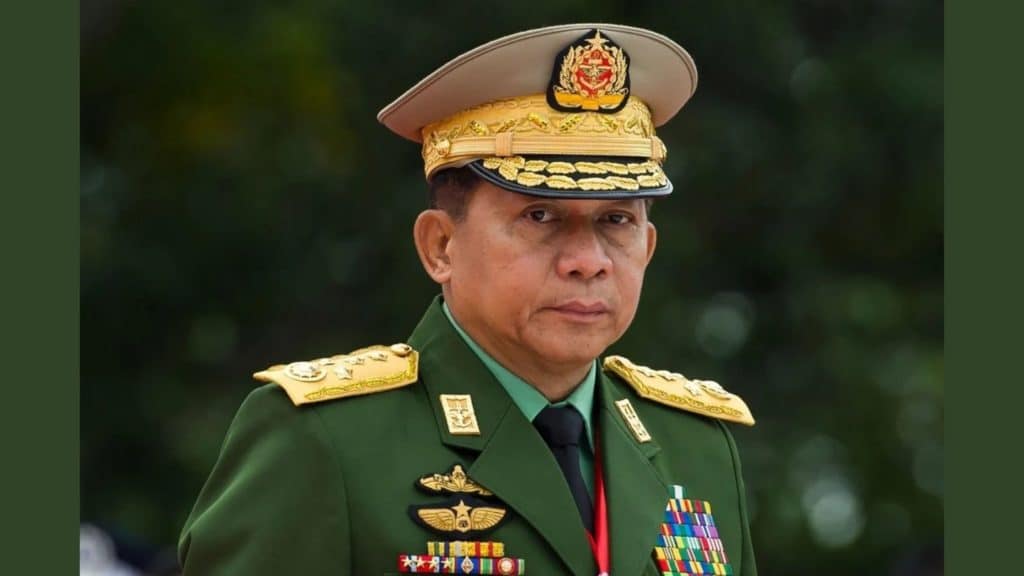
After World War II
The aftermath of the world war caused the British Crown to abandon control over their colonies. The British started discussing their terms of Burmese independence with Aung San. First general elections were held in 1947, which resulted in Aung Sang’s AFPFL beating opposing parties lead by the Karens, communists, and Anglo Burmans.
After the elections, he started planning to run the government with his cabinet members. On one such day with his Cabinet members, shooters stormed into the government building. They shot him and four other council members dead. He still carries a legacy, often revered as the architect of modern Burma. Aung San Su Kyi was only two years old then.
Burma after Aung San assassination
4 January 1948 was the date that witnessed the independence day of Burma. U Nu, the foreign minister of the Japanese puppet government, became the first Prime Minister. During his initial years as Prime Minister, he oversaw several communist factions emanating from the newly independent country. He even witnessed internal divisions within the party(AFPFL).
The divisions provoked him to relinquish his Prime Minister post to Chief of Army Staff, Ne Win. The Army was asked to be a “caretaker government”. However, U Nu returned to power in the 1960s general elections defeating his party’s rogue faction, often called Stable Faction. But, this term ended with Coup D’état lead by Ne Win himself.
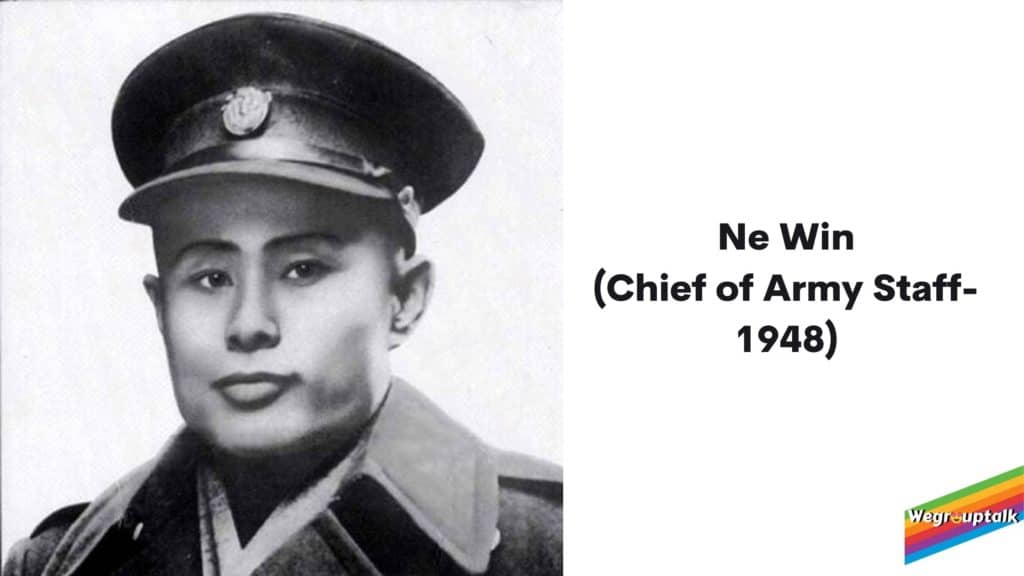
This military rule inflicted Myanmar for 26 long years. Coup D’état is typically an illegal seizure of government in power by a few people. They are generally bloodless instead of armed rebellion. A large number of people oppose the government and overthrow it.
Aung San Suu Kyi and her Rise
Aung San Suu Kyi’s mother Khin Kyi was appointed as Burma’s ambassador to India in 1960. Suu Kyi completed her graduation from Delhi University and then went to the Oxfords for her master’s. After getting married to an Englishman Michael Aris, she returned to Myanmar to fight for Democratic reforms.
Her popularity quickly rose, gathering massive support for the pro-democratic movement. In 1988, during the 8888 uprisings, she became the general secretary of NLD. She was one of the prominent pro-democratic figures detained by the military regime. The regime finally announced the general elections of 1990.
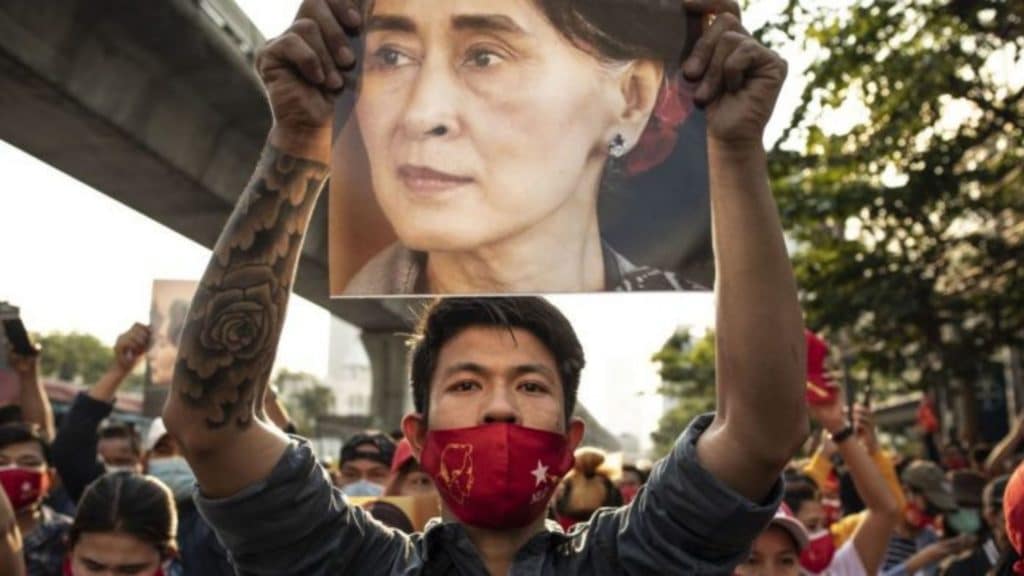
Obstacles in the path of democracy: Detention and attempted Assassination
NLD fought the elections and won by a landslide, sweeping away more than 81% of the seats. The military rejected the results and put her back to detention alleging forgery during the electoral process. Her house arrest did not quell her popularity. On 30 May 2002, she nearly escaped an assassination.
Nearly 70 people were killed that day by a military-sponsored mob. All 70 were associated with NLD. This bloody day came to be known as Dapayin Massacre. In 2007, the military suppressed the democratic protest by teachers, lawyers, students, and government employees using arms. Many protestors were even killed by military action.
Protests, Democracy and Power
The protests were a result of political and economic issues, including soaring fuel prices and minority oppression. This series of protests came to be known as the Saffron Revolution. In 2008, the military-drafted a constitution and even announced the next general elections of 2011. NLD lead by Suu Kyi boycotted the polls and rejected the constitution.
The constitution had several provision which gave considerable powers to the military. It was stated that the Army would have 25% of seats reserved in both the houses of Parliament. It also barred women married to foreign citizens be assumed as head of government. USDP formed the government as they won the elections.
However, in the by-election of 2012, NDL won 43 out of 45 seats emerging as an opposition party. Aung San Suu lead NLD came to power in 2015 and assumed State Counsellor’s role (defacto prime minister). With Myanmar accepting the democratic reforms, the sanctions which the Asian country faced were lifted by the Obama Administration.
Aung San Suu Kyi: Fall from the Grace
Often compared to Gandhi and Mandella, her popularity internationally plummeted once she came to power. Her tenure saw the ethnic cleansing of Rohingya Muslims by the military. According to the BBC, nearly 700,000 Muslims were persecuted in Bangladesh. The government refused to see them as citizens but as illegal immigrants.
Aung San Suu Kyi remained quiet all this while. In 2019 appeared before the International Court of Justice to deny the allegations against military instituted genocide. In an interview in the BBC, Aung San Suu Kyi termed the Rohingya crisis as a conflict between two communities and said that “Ethnic cleansing” was too strong to describe it.
Many demanded to retract her Nobel Peace Prize which she won in 1991. It was not her inability but her silence which miffed the international community.
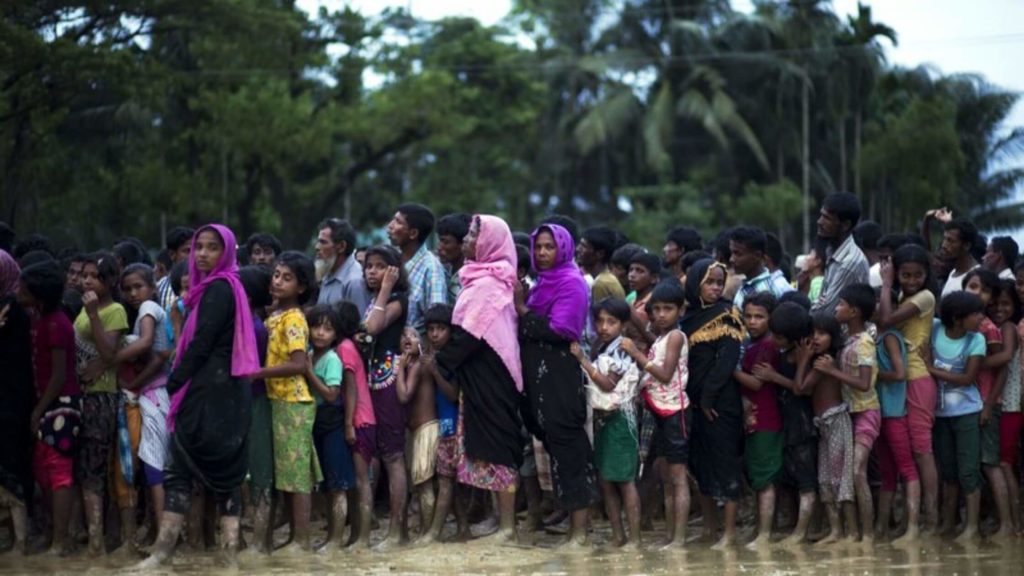
Game of Polarisation
Many believe that it was ignorance or sycophancy of Aung San Suu Kyi towards the military regime, which lead to this fateful day. Despite the international community denouncing her, her popularity has remained unaffected. She is highly popular among the Buddhist community, which is the majority population of Myanmar. The November 2020 election results substantiate the popularity of Aung San Suu Kyi. NLD secured 396 seats combining both the Parliament houses, six seats more than the previous election wins.
This clarifies that the military was threatened by the support Aung San Suu Kyi had in Myanmar. They were looking for ways to oust her from power. It seems clear that post-emergency general elections will bar Suu Kyi from contesting.
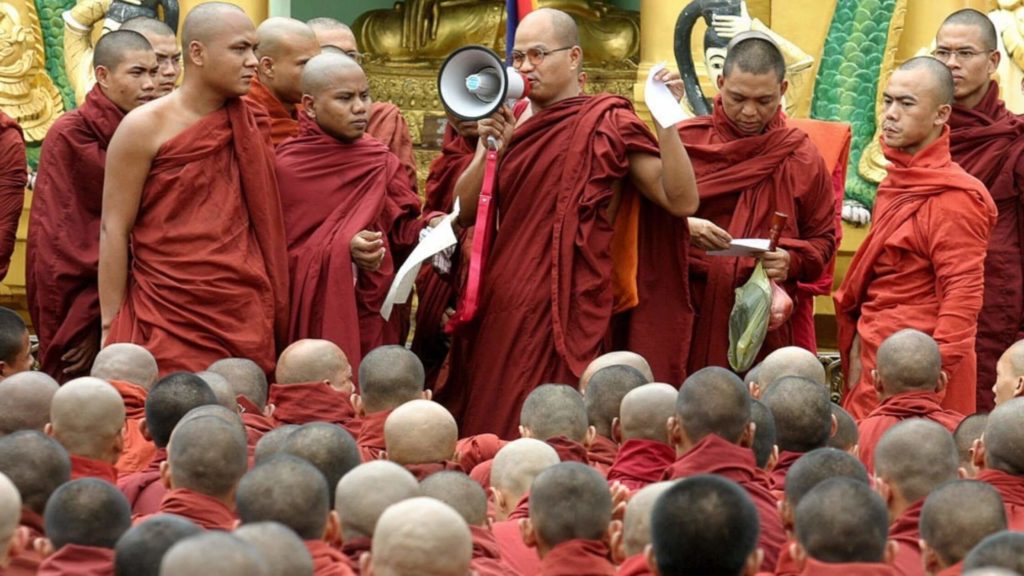
International Outrage
The military coup has created a series of responses; most of them pledge to serve diplomatic ties. On the contrast, India has failed to respond in either way. This is probably because of Myanmar’s Military’s close relations with China. Condemning the action would consolidate Myanmar’s diplomatic support towards the dragon nation.
Sanctions and Support
UN Secretary-General António Guterres condemned the coup, declaring it “a serious blow to the democratic reforms”. The US demanded the military to “relinquish power, restore the democratically elected government, release those detained and life all telecommunication restrictions, and refrain from violence”.
International organizations, including the EU, are looking to impose sanctions on Myanmar. New Zealand Prime Minister Jacinda Ardern came to the forefront to announce that her country is suspending high level political and Military contact with Myanma.
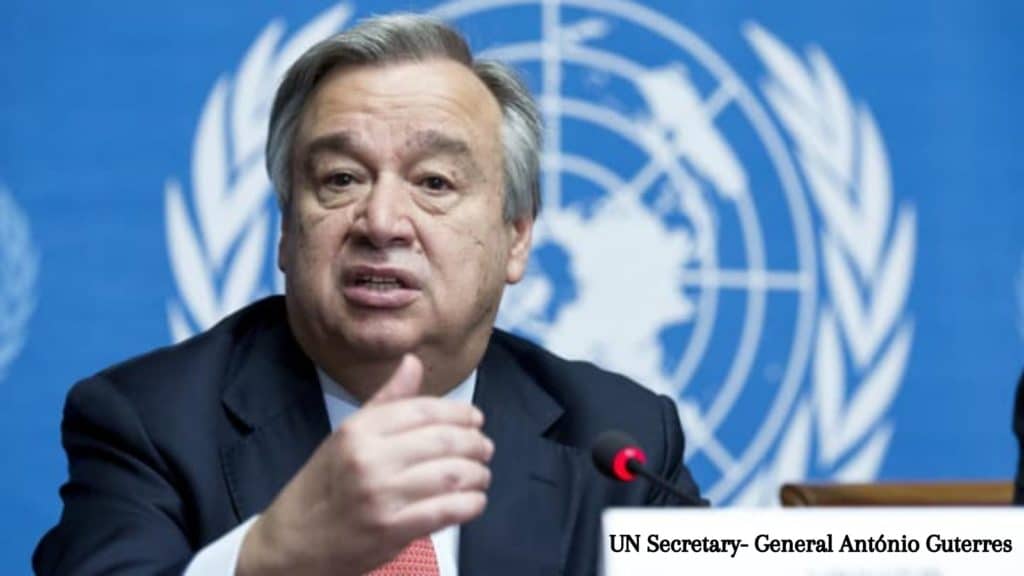
China being a communist nation, has over the years, made heavy investments in the county and shall not make any statements sour the relations. It even vetoed the UN Security Council’s joint condemnation against military actions. China-Myanmar Economic Corridor is proof of their close ties. China even urged other nations to refrain from intervening in Myanmar’s internal matters and encouraged them to “resolve differences”.
Oppose, Resist and Protest: The only way to protect democracy
The military has imposed a curfew, shut down its banks, stopped all passenger flights, and blocked the internet in several areas. But, still, people are coming to the streets to demonstrate their anger towards the oppressive regime. The troops deployed to suppress dissent have resorted to violent measures like water cannon, rubber bullets, and illegal arrests. Still, the movement is heading strong in Yangon’s capital city.
The military even raided the NLD’s offices and vandalized the property. The protests are being seen as one of the biggest after the 1988 uprising. What looks spooky is the future of its fallen democratic leader who again is under house arrest. But, unlike the previous times, this time, she will not be seen as a human rights icon battling for democracy.
Follow us on FACEBOOK, INSTAGRAM and TWITTER to stay connected.
Also Read- Will Montreal Protocol improve the situation in 2021?

